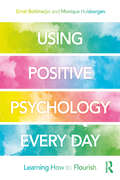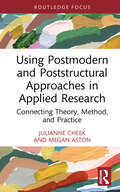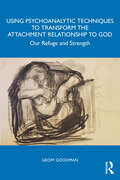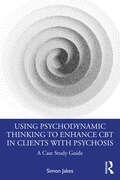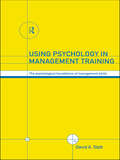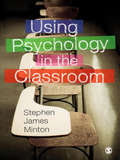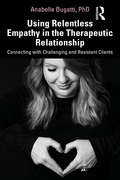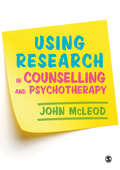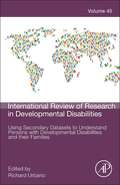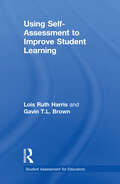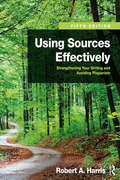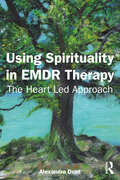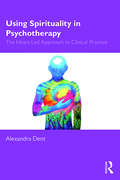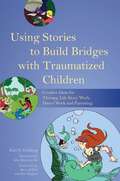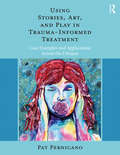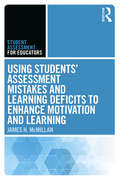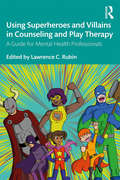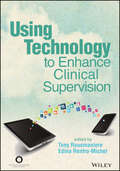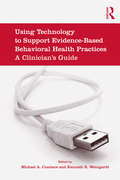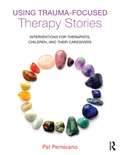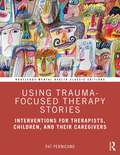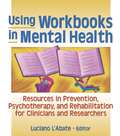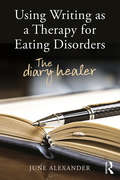- Table View
- List View
Using Positive Psychology Every Day: Learning How to Flourish
by Monique Hulsbergen Ernst BohlmeijerWe are all looking to flourish, to experience joy, feel engaged with the world, and experience meaningful lives. But the stresses and strains of our daily lives makes this a challenge. Using Positive Psychology Every Day: Learning How to Flourish is about (re)finding the art of living, enabling you to flourish. Bringing together the best of positive psychology, this book introduces eight evidence-based resources of well-being and flourishing: positive emotions, the discovering and use of strengths, optimism, compassion, post-traumatic growth, positive relationships and spirituality. Each chapter has a concise, simple theoretical introduction and several evidence-based, easy-to-apply exercises. This book is for anyone experiencing stress, distress or lower well-being, as well as coaches and therapists who can use the book for clients in the context of guided self-help.
Using Postmodern and Poststructural Approaches in Applied Research: Connecting Theory, Method, and Practice (Developing Qualitative Inquiry)
by Megan Aston Julianne CheekUsing Postmodern and Poststructural Approaches in Applied Research introduces the complex theoretical approaches of postmodern and poststructural thought in ways that are accessible and understandable. The book begins by grounding our discussion with the foundational work of scholars who first wrote about postmodern and poststructural approaches. We then follow with examples of how scholars continue to use these approaches and theories today and apply them in different practice areas. Examples are provided from the author’s own research, teaching, and mentorship along with activities for the reader, to support them with their own research and application of postmodern and poststructural thought. Interviews and reflections are shared from students and researchers who have used postmodern and poststructural approaches in their own work. This book is for students and researchers who want to use postmodern and poststructural approaches to make a difference in practice areas where they work or have connections. It intends to inspire, excite, and support students, academics, researchers, and practitioners to use postmodern and poststructural concepts in their everyday practices.
Using Projective Methods with Children: The Selected Works of Steve Tuber
by Steve TuberNominated for a 2018 Gradiva Award for Best Book by the National Association for the Advancement of Psychoanalysis, Using Projective Methods with Children is an enhanced synthesis of Steve Tuber’s previously published research on the study of projective methods to assess the representations of self and others, as well as the actual interpersonal experiences children internalize in the form of these representations. Integrating conceptual and empirical work, with an emphasis on the Rorschach Inkblot Method (RIM), the book offers unique, evidence-based information on the importance of assessing particular aspects of a child’s inner self. The studies cover a broad range of topics such as dreams, anxiety disorders, political oppression, homelessness, and multiculturalism, and each is supplemented with an analytical introduction. A section that discusses future areas of research is also included.
Using Psychoanalytic Techniques to Transform the Attachment Relationship to God: Our Refuge and Strength
by Geoff GoodmanUsing Psychoanalytic Techniques to Transform the Attachment Relationship to God demonstrates how clinicians can use Attachment-Informed Psychotherapy (AIP) to enhance clients’ understanding of their relationship to God and significant others.Geoff Goodman discusses four distinct attachment relationships to the God of personal spiritual experience and explains the implications for working with clients in psychotherapy. By asking how therapists can work through clients’ attachment relationship to God as a displacement of their attachment relationships to parents, and how therapists can work through clients’ attachment relationships to parents as a displacement of their attachment relationship to God, this book provides unique insight into the therapeutic process. Goodman’s objective is to enable clinicians to transform these attachment relationships, restoring wholeness and unity—a crucial treatment goal of AIP.This book will be a valuable resource for psychoanalysts, psychotherapists, marriage and family therapists, and pastoral counsellors in practice and in training.
Using Psychodynamic Thinking to Enhance CBT in Clients with Psychosis: A Case Study Guide
by Simon JakesUsing Psychodynamic Thinking to Enhance CBT in Clients with Psychosis presents a comprehensive method for linking clients’ symptoms to their personal development and life problems. Using concrete examples and extensive case descriptions that often span many years, the chapters show clinicians how to construct a psychodynamic case conceptualisation and how to then guide the direction of the therapy. The book will be of interest to experienced clinicians, therapists in training, and anyone looking for an integrative approach to the psychotherapy of clients with psychotic presentations.
Using Psychology in Management Training: The Psychological Foundations of Management Skills
by David A. StattMany of the fundamental principles of psychology form the basis for management training.Using Psychology in Management Training aims to give trainers and student trainers a grounding in the ideas and research findings which are most relevant to their work.Three major areas are explored from a management training perspective and illustrated with examples* the individual psychological processes of learning, personality and motivation which are at the heart of most management training courses* the social psychological processes of group dynamics, leadership and stress which all arise from the interaction of people at work* the psychology of the actual training experience including the crucial training skill of communication and what is needed to meet organisational training needsUsing Psychology in Management Training has a clear and accessible format with a comprehensive glossary of unfamiliar terms and suggestions for further reading at the end of each chapter.
Using Psychology in the Classroom
by Mr Stephen James MintonPsychology can be applied to understanding a range of current issues and topics in teaching and educational practice. Starting with the question, 'what is psychology?', and a topical overview of child and adolescent development, Stephen James Minton moves on to discuss seven areas of contemporary concern in education, showing how psychological approaches can help teachers in key areas of practice. Areas covered include: - the self, self-esteem, and self-esteem enhancement - intelligence, learning styles and educational attainment - positive teaching, co-operative learning and assertive discipline - special educational needs - preventing and countering bullying and cyber-bullying - dealing with prejudice - stress and stress management This detailed text will be vital reading for all those studying psychology and applied psychology in primary and secondary teaching degree programmes. Constant links between theory and practice also make it a valuable read for practitioners reflecting on their approach to common classroom scenarios. Stephen James Minton is a lecturer in Psychology of Education at Trinity College Dublin.
Using Relentless Empathy in the Therapeutic Relationship: Connecting with Challenging and Resistant Clients
by Anabelle BugattiWith a refreshing approach to resistance in therapy, Using Relentless Empathy in the Therapeutic Relationship offers practical tools and tips to help therapists and clinicians across all modalities of counseling work with their most challenging clients. By illustrating the power of empathic responsiveness coupled with attachment science and interventions, the author goes straight to the heart of what’s vital for building strong therapeutic alliances with even the most difficult clients. Using Relentless Empathy in the Therapeutic Relationship presents effective tools that clinicians and therapists can use to move away from pathological diagnostic labels toward engaging with people in their distress. This is a valuable resource to anyone in a helping profession, teaching them to effectively use their most valuable instrument—themselves—by harnessing the power of relentless empathy to shape relationships with not only clients but also the outside world.
Using Research in Counselling and Psychotherapy
by John McLeodIn this book bestselling author John McLeod examines the multiple ways in which research can be used to inform and enhance counselling practice. The author discusses how research impacts on policy and practice, covering research knowledge, values, research awareness and skills. Further chapters cover: Using research to understand the therapy process and outcomes Using research to make sense of other lives Using client feedback to enhance practice Using research to build professional networks and effective organisations. The book can be used throughout training on counselling, psychotherapy and counselling psychology courses, to support the development of professional competencies and personal development. It will also be valuable reading for both practitioners and researchers.
Using Research in Counselling and Psychotherapy
by John McLeodIn this book bestselling author John McLeod examines the multiple ways in which research can be used to inform and enhance counselling practice. The author discusses how research impacts on policy and practice, covering research knowledge, values, research awareness and skills. Further chapters cover: Using research to understand the therapy process and outcomes Using research to make sense of other lives Using client feedback to enhance practice Using research to build professional networks and effective organisations. The book can be used throughout training on counselling, psychotherapy and counselling psychology courses, to support the development of professional competencies and personal development. It will also be valuable reading for both practitioners and researchers.
Using Secondary Datasets to Understand Persons with Developmental Disabilities and their Families
by Richard C. UrbanoInternational Review of Research in Developmental Disabilities is an ongoing scholarly look at research into the causes, effects, classification systems, syndromes, etc. of developmental disabilities. Contributors come from wide-ranging perspectives, including genetics, psychology, education, and other health and behavioral sciences. The text provides the most recent scholarly research in the study of developmental disabilities. It covers many topics, offering a vast range of perspectives and is an excellent resource for academic researchers.
Using Self-Assessment to Improve Student Learning (Student Assessment for Educators)
by Lois Ruth Harris Gavin T.L. BrownUsing Self-Assessment to Improve Student Learning synthesizes research on self-assessment and translates it into actionable guidelines and principles for pre-service and in-service teachers and for school leaders, teacher educators, and researchers. Situated beyond the simple how-to frameworks currently available for teachers and graduate students, this volume illuminates self-assessment’s complexities and substantial promise to strategically move students toward self-regulated learning and internalized goals. Addressing theory, empirical evidence, and common implementation issues, the book’s developmental approach to quality self-assessment practices will help teachers, leaders, and scholars maximize their impact on student self-regulation and learning.
Using Sources Effectively: Strengthening Your Writing and Avoiding Plagiarism
by Robert A. HarrisNow in its fifth, expanded edition, Using Sources Effectively, Fifth Edition targets the two most prominent problems in current research-paper writing: the increase in unintentional plagiarism and the ineffective use of research source material. Designed as a supplementary textbook for both undergraduate and graduate courses, this book will help every student who uses research in writing. Included in this edition are coverage of research strategies and source selection (Chapter 2), a chapter on quoting sources effectively (Chapter 4), and a chapter on sentence patterns (Chapter 10). APA and MLA citation styles have been updated throughout the text. To the student: This book was written to give you the knowledge and tools you can use to make your research-based writing more powerful and effective. Here are some examples: Mini-Research Projects at the end of each chapter to sharpen your research and evaluation skills A set of practical, useful rhetorical devices to help improve the clarity and impact of your writing Increased emphasis on synthesis writing—weaving source use into your own thinking—to give your writing more interest and persuasive power Instruction in close reading to help you better grasp what an author is discussing or arguing Strategies for organizing and positioning your sources to strengthen your central argument.
Using Spirituality in EMDR Therapy: The Heart Led Approach
by Alexandra DentUsing Spirituality in EMDR Therapy offers a means for EMDR therapists to integrate a spiritual perspective into their own lives as well as their clinical practice.The book offers a valuable alternative to traditional forms of psychotherapy by placing an emphasis on purpose and meaning. Taking a spiritually informed model, Heart Led Psychotherapy (HLP), which is applicable to anyone regardless of their spiritual beliefs, the book uses a BioPsychoSocioSpiritual approach to treat psychological distress. The book provides a comprehensive guide on how to incorporate spirituality into each of the 8 phases of EMDR therapy and beyond. It will increase your confidence to work spiritually with clients to deepen their transformative healing process and support them to live a more authentic, heart led life.Illustrated with case studies to highlight key points and including a range of practical resources, exercises, scripts and strategies, this engaging book will be of great interest to EMDR therapists.
Using Spirituality in Psychotherapy: The Heart Led Approach to Clinical Practice
by Alexandra DentUsing Spirituality in Psychotherapy: The Heart Led Approach to Clinical Practice offers a means for therapists to integrate a spiritual perspective into their clinical practice. The book provides a valuable alternative to traditional forms of psychotherapy by placing an emphasis on purpose and meaning. Introducing a new spiritually-informed model, Heart Led Psychotherapy (HLP), the book uses a BioPsychoSocialSpiritual approach to treat psychological distress. When clients experience challenges, trauma or attachment difficulties, this can create blocks and restrictions which result in repeated patterns of behaviours and subsequent psychological distress. Based on the premise that everyone is on an individual life journey, HLP teaches clients to become an observer, identifying the life lesson that they are being asked to understand or experience. The model can be used whether a client has spiritual beliefs or not, enabling them to make new choices that are in keeping with their authentic selves, and to live a more fulfilled and peaceful life. Illustrated by case studies to highlight key points, and including a range of practical resource exercises and strategies, this engaging book will have wide appeal to therapists and clinicians from a variety of backgrounds.
Using Stories to Build Bridges with Traumatized Children: Creative Ideas for Therapy, Life Story Work, Direct Work and Parenting
by Kim Golding Julia Mcconville Dan Hughes Steve KillickUsing Stories to Build Bridges with Traumatized Children is full of creative ideas for how you can use stories therapeutically with children in counselling, life story work or direct work. Psychologist Kim S. Golding shows how you can use stories to build connections with children aged 4-16 and support their recovery from trauma and stress. She illustrates the techniques with 21 stories adapted from her own clinical work with children and families, and explains how you can expand or adapt them to make them more relevant for a particular child. Advice and stories are arranged into sections dealing with common psychological issues, including looking back and moving on, lack of trust and need for attention. Golding also gives invaluable tips for planning stories and life story work, and for storymaking with children. She also describes how stories can be used therapeutically with parents of traumatized children and as a tool for self-reflection by counsellors. Imaginative and practical, this book will be enormously useful for counsellors, psychologists, therapists and social workers working with traumatized children, and will also be helpful for parents and carers involved in therapeutic parenting.
Using Stories, Art, and Play in Trauma-Informed Treatment: Case Examples and Applications Across the Lifespan
by Pat PernicanoThis book shows new and experienced therapists how to use meaningful therapeutic material in art, stories and play to facilitate shifts in outlook and behavior. Using a wide variety of case studies, Dr. Pernicano lays out a framework for problem clarification, conceptualization, trauma-informed intervention, and positive therapeutic outcome with clients across the lifespan. Case examples include working with clients suffering from dissociation, depression, anxiety, mood dysregulation, adjustment to life change, grief and loss, and/or panic attacks. Replete with client-generated illustrations as well as practical tips and strategies, Using, Art, Stories, and Play in Trauma-Informed Treatment teaches therapists how to think conceptually, plan systemically and intervene flexibly to improve treatment outcomes for diverse clients.
Using Students' Assessment Mistakes and Learning Deficits to Enhance Motivation and Learning (Student Assessment for Educators)
by James H. McMillanBeing wrong is an integral part of the assessment process, and understanding how to learn from those mistakes, errors, and misconceptions helps educators and students get the most from their learning experience. In this practical volume, James H. McMillan shows why being wrong (sometimes) is an essential part of effective learning and how it can be used by teachers to motivate students and help develop positive achievement-related dispositions. The six concise chapters of Using Students’ Assessment Mistakes and Learning Deficits to Enhance Motivation and Learning show how mistakes affect students’ engagement, self-regulation, and knowledge, and how teachers can most effectively contextualize supposed failures to help students grow.
Using Superheroes and Villains in Counseling and Play Therapy: A Guide for Mental Health Professionals (Routledge Monographs In Classical Studies)
by Lawrence RubinThrough rich and research-grounded clinical applications, Using Superheroes and Villains in Counseling and Play Therapy explores creative techniques for integrating superhero stories and metaphors in clinical work with children, adolescents, adults and families. Each chapter draws on the latest empirically supported approaches and techniques to address a wide range of clinical challenges in individual, family and group settings. The chapters also explore important contextual issues of race, gender, culture, age and ethnicity and provide case studies and practical tips that clinicians can use to support clients on their healing journey.
Using Technology to Enhance Clinical Supervision
by Tony Rousmaniere Edina Renfro-MichelThis is the first comprehensive research and practice-based guide for understanding and assessing supervision technology and for using it to improve the breadth and depth of services offered to supervisees and clients. Written by supervisors, for supervisors, it examines the technology that is currently available and how and when to use it. Part I provides a thorough review of the technological, legal, ethical, cultural, accessibility, and security competencies that are the foundation for effectively integrating technology into clinical supervision. Part II presents applications of the most prominent and innovative uses of technology across the major domains in counseling, along with best practices for delivery. Each chapter in this section contains a literature review, concrete examples for use, case examples, and lessons learned. *Requests for digital versions from ACA can be found on www.wiley.com. *To request print copies, please visit the ACA website. *Reproduction requests for material from books published by ACA should be directed to permissions@counseling.org
Using Technology to Support Evidence-Based Behavioral Health Practices: A Clinician's Guide
by Michael A. Cucciare Kenneth R. WeingardtThe use of technology to provide cost-effective behavioral healthcare is emerging as a crucial aspect of treating a wide variety of behavioral health problems. However, many behavioral health providers lack the knowledge and skills necessary to effectively integrate technology-based behavioral tools into their practice. In Using Technology to Support Evidence-Based Behavioral Health Practices, the authors help providers implement technology-based behavioral health practices in various healthcare settings and with various mental health disorders. Divided into two parts, the text first addresses specific disorders or problem areas, then presents issues concerning implementation and evaluating such tools in clinical practice and important ethical issues to consider when doing so.
Using Trauma-Focused Therapy Stories: Interventions for Therapists, Children, and Their Caregivers
by Pat PernicanoUsing Trauma-Focused Therapy Stories is a groundbreaking treatment resource for trauma-informed therapists who work with abused and neglected children ages nine years and older as well as their caregivers. The therapy stories are perfect accompaniments to evidence-based treatment approaches and provide the foundation for psychoeducation and intervention with the older elementary-aged child or early pre-teen. Therapists will also benefit from the inclusion of thorough guides for children and caregivers, which illustrate trauma and developmental concepts in easy-to-understand terms. The psychoeducational material in the guides, written at a third- to fourth-grade reading level, may be used within any trauma-informed therapy model in the therapy office or sent-home for follow-up. Each therapy story illustrates trauma concepts, guides trauma narrative and cognitive restructuring work, and illuminates caregiver blind spots; the caregiver stories target issues that often become barriers to family trauma recovery. No therapist who works with young trauma survivors will want to be without this book, and school-based professionals, social workers, psychologists and others committed to working with traumatized children will find the book chock-full of game-changing ideas for their practice.
Using Trauma-Focused Therapy Stories: Interventions for Therapists, Children, and Their Caregivers (Routledge Mental Health Classic Editions)
by Pat PernicanoUsing Trauma-Focused Therapy Stories is a groundbreaking treatment resource for trauma-informed therapists who work with abused and neglected children ages nine years and older as well as their caregivers. The classic edition includes a new preface from the author reflecting on changes in the field since the book’s initial publication. The therapy stories are perfect accompaniments to evidence-based treatment approaches and provide the foundation for psychoeducation and intervention with the older elementary-aged child or early pre-teen. Therapists will also benefit from the inclusion of thorough guides for children and caregivers, which illustrate trauma and developmental concepts in easy-to-understand terms. The psychoeducational material in the guides, written at a third- to fourth-grade reading level, may be used within any trauma-informed therapy model in the therapy office or sent-home for follow-up. Each therapy story illustrates trauma concepts, guides trauma narrative and cognitive restructuring work, and illuminates caregiver blind spots; the caregiver stories target issues that often become barriers to family trauma recovery. No therapist who works with young trauma survivors will want to be without this book, and school-based professionals, social workers, psychologists and others committed to working with traumatized children will find the book chock-full of game-changing ideas for their practice.
Using Workbooks in Mental Health: Resources in Prevention, Psychotherapy, and Rehabilitation for Clinicians and Researchers
by Luciano L'AbateThe use of workbooks in therapy might represent one of the biggest breakthroughs that has occurred in decades. Using Workbooks in Mental Health: Resources in Prevention, Psychotherapy, and Rehabilitation for Clinicians and Researchers examines the effectiveness of mental health workbooks designed to address problems ranging from dementia and depression to addiction, spousal abuse, eating disorders, and more. Compiled by Dr. Luciano L&’Abate, a leading authority on mental health workbooks, this resource will help clinicians and researchers become aware of the supportive evidence for the use of workbooks. Using Workbooks in Mental Health examines workbooks designed to specifically help: clients affected by dementia or depression abused women gambling addicts women who have substance-abuse addictions incarcerated felons couples preparing for marriage children with school refusal disorder and more! An essential reference for mental health professionals, graduate students, administrators, and researchers, Using Workbooks in Mental Health also explores the role of workbooks in psychological intervention over the past decade. Although workbooks are not yet part of the mainstream of psychological intervention, they are growing in popularity as their many advantages are recognized. They are easy to use by almost any client, they are cost-effective to both therapist and client in terms of money and time, they provide therapists with written assignments to use as homework for individuals, couples, and families, and they can be used in any setting, especially in computer-assisted offline or online interventions. In addition, this book shows how workbooks can be used to administer therapy to previously unreachable clients such as: people who are reluctant to talk to an authoritative figure or a stranger people who cannot afford face-to-face treatments incarcerated offenders who have not been helped by talk therapies Internet users who are searching for help via computer rather than in person
Using Writing as a Therapy for Eating Disorders: The diary healer
by June AlexanderUsing Writing as a Therapy for Eating Disorders: The diary healer uses a unique combination of evidence-based research and raw diary excerpts to explain the pitfalls and benefits of diary writing during recovery from an eating disorder. In a time when diary writing remains a largely untapped resource in the health care professions, June Alexander sets out to correct this imbalance, explaining how the diary can inspire, heal and liberate, provide a learning tool for others and help us to understand and cope with life challenges. The book focuses on the power of diary writing, which may serve as a survival tool but become an unintended foe. With guidance, patients who struggle with face-to-face therapy are able to reveal their thoughts through writing and construct a strong sense of self. The effects of family background and the environment are explored, and the therapeutic value of sharing diaries, to better understand illness symptoms and behaviours, is discussed. Using Writing as a Therapy for Eating Disorders will be of interest to those who have recovered or are recovering from eating disorders or any mental illness, as well as therapists, clinicians and others working in the medical and healthcare professions.
